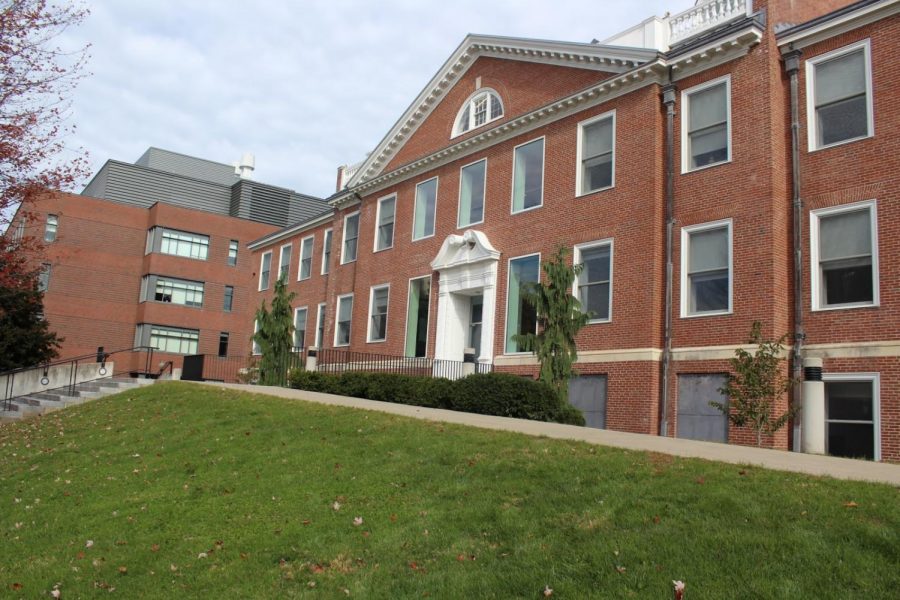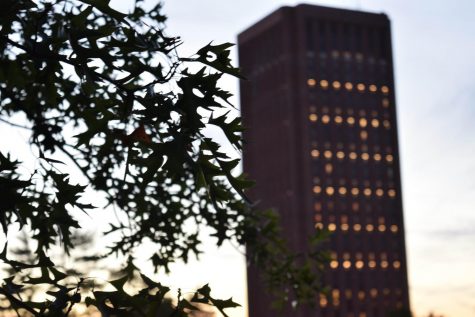Nursing students, local nurses divided on ballot Question 1
(Abigail DesVergnes/Amherst Wire)
Skinner Hall, College of Nursing at UMass.
AMHERST — Retired nurses, nursing students, and hospitals across Massachusetts are divided on whether to vote “Yes” or “No” on ballot Question 1 in the upcoming midterm election. If passed, the proposed law would limit the number of patients assigned to nurses at hospitals and health clinics across the state.
In a printed flyer explaining the ballot question, Lisa Hall, a registered nurse from Northampton, said, “A ‘Yes’ vote is supported by a Mass. nurses’ union which represents 25 percent of Mass. nurses. It will set strict standards for maximum staffing for all hospital units from orthopedic to ER.”
“Hospitals will have to come up with enough nurses or shut down units they can’t staff to the legal standard or face fines. Nurses will make an acuity assessment each shift to be sure they are able to handle the patient load,” Hall added.
“The American Nurses Association supports a ‘No’ vote on Question 1,” Hall said. “They believe the best staffing needs to be determined by a committee of nurses and administrators, on a case by case basis, taking into consideration how sick the patients in a given unit may be, how well trained and experienced the nurses working that shift are, and how many admissions and discharges may occur.”
Last month, officials at Cooley Dickinson Hospital in Northampton expressed their opposition to Question 1 in a press release.
“Government mandated, fixed approaches to meeting the changing needs of hospitalized patients would have severe consequences,” said Chief Nursing Officer Angela Belmont.
According to Belmont, current decisions about staffing are made by the nurses and hospital managers.
“If the legislation passes, Massachusetts hospitals would need to hire and train more than 5,000 registered nurses in a seven-week period,” she said.
“Many hospitals will have to consider reducing patient care units in order to comply. It’s inevitable that some programs will close; it is predicted that some community hospitals would close.”
An editorial about Question 1 in the Boston Globe cited that the health policy commission estimated Question 1 would cost up to $1 billion a year in Massachusetts hospitals. This would include salaries, benefits and other compliance costs, according to the article.
Leslie Nyman, a retired nurse from Pelham, worked in the Pioneer Valley for 18 years and is advocating that citizens of Massachusetts vote “yes” on the ballot.
According to Nyman, there were times during her nursing career where she worked a full shift and had to pick up another shift due to short staffing or if another nurse called out of work.
“By the end of the double, I would be exhausted,” Nyman said. “That’s just not fair to anybody — the nurses and the patients. Everybody deserves the necessary care they need.”
If the “no” vote wins, Nyman said nurses will be the ones to ultimately get the short end of the stick.
“For the nurses who are caring for 10 patients at a time, that’s a lot of care,” Nyman said.
According to Nyman, people like herself choose to become a nurse in order to help others, but now it’s the nurses who need the help, she added.
“It comes down to the question: ‘What are your priorities?’” she said. “For me, it’s to satisfy the nurses’ needs and ensure quality patient care.”
On the other hand, prospective student nurses at UMass Amherst, who were interviewed, disagree with Nyman.
“I would vote no because if they say yes, then it’s just too rigid of a law,” said Erin Murphy, a sophomore nursing major. “Each hospital is so different and you can’t predict in different demographics what’s going to be needed, and if you put a restriction on the patient ratio, then it creates a lot more problems that weren’t already there.”
Murphy went on to use research findings and facts she’d heard from her sister who works as a nurse.
“At least in research findings, hospitals have a good grip on their patient ratios and it differs from hospital to hospital,” she said. “It hasn’t been a problem in the past and what they want to do is prevent burn out but if they do that, they’ll need more nurses and if they hire more nurses, they’ll have to layoff other people in the hospital since they won’t have enough funding. It will create a lot more problems.”
Izzy Andrzejewski, another sophomore nursing major, agrees that things should stay the way they are, but does see both sides of the issue.
“I believe that it should stay how it is because the facilities that nurses work in are very circumstantial,” said Andrzejewski. “I feel like generalizing the number of nurses would be very unfair. In highly stressful, serious situations such as nurses in the ICU, it’s critical there is minimal patients per nurse so the nurse can take very good care of their patients needs. But if it’s a low-stress situation such as an old person’s home or a slow day at the hospital or cancer clinic, a nurse will be totally fine having more patients at once.”
What does each vote mean?
Yes:
A “Yes” vote would limit the number of patients that could be assigned to one registered nurse in hospitals and certain other health care facilities.
No:
A “No” vote would make no change to current laws relative to patient-to-nurse limits.
Email Abigail at [email protected], or follow her on Twitter @abbydesjournal.

"The way to right wrongs is to turn the light of truth upon them." - Ida B. Wells, Email Abigail at [email protected] and follow her on Twitter @abbydesjournal










